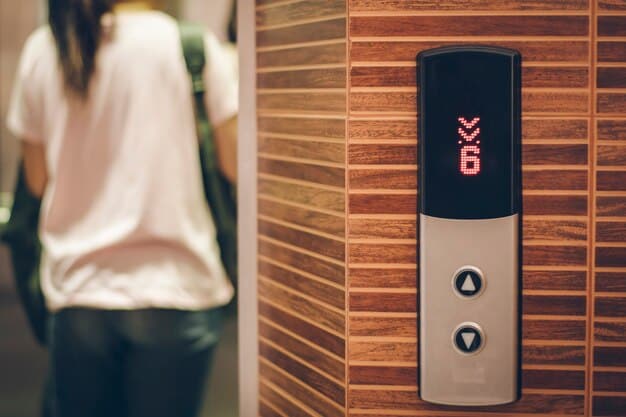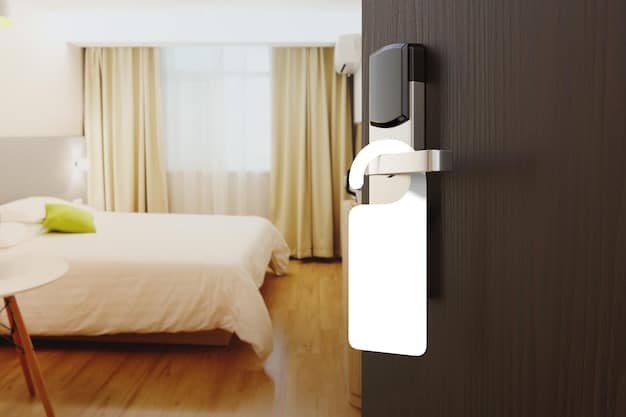Hotel Room Safety in 2025: New Security Measures for Travelers

Ensuring hotel room safety is a growing concern for travelers; in 2025, enhanced security measures, including advanced locking systems, improved surveillance, and stringent staff training, aim to provide a safer and more secure environment for guests.
Are you planning a trip in 2025? One of the most important aspects of travel is ensuring your safety and security, and your hotel room should be a sanctuary. This article delves into recent security updates designed to keep you safe, answering the question: Is Your Hotel Room Really Safe? New Security Updates for 2025 Travelers.
Understanding the Current State of Hotel Security
Hotel security is constantly evolving to meet emerging threats and address the concerns of travelers. It’s essential to understand the current landscape to appreciate how new updates aim to improve safety.
Common Security Weaknesses
Before we look at the updates, it’s important to know some potential weaknesses in existing hotel security protocols. These vulnerabilities can range from physical issues to procedural gaps.
- Compromised Key Cards: Key cards can be easily copied or stolen, granting unauthorized access.
- Lack of Advanced Surveillance: Older surveillance systems may have blind spots or low-quality footage.
- Inadequate Staff Training: Staff members may not be fully trained to recognize and respond to security threats.
Advancements in Security Technology
Despite vulnerabilities, many hotels have adopted advanced technologies to protect their guests. These advancements lay the foundation for future improvements.
- Keyless Entry Systems: Mobile-based key systems and biometric locks are becoming more common.
- Enhanced Surveillance: High-definition cameras and AI-powered monitoring systems offer better threat detection.
- Improved Cybersecurity: Protecting guest data and hotel systems from cyber attacks is also a priority.
Assessing the present landscape of hotel security provides a foundation for exploring the upgrades to come in 2025, designed to fortify safety measures and address vulnerabilities.
Key Security Updates Expected in 2025
Several key security updates are anticipated to become standard in hotels by 2025. These enhancements target various aspects of hotel security, from access control to emergency response.

Advanced Locking Systems
Traditional key cards are becoming obsolete, and new locking systems offer enhanced security. These systems often incorporate multiple layers of authentication.
- Biometric Scanners: Fingerprint and facial recognition systems that grant access only to authorized individuals.
- Multi-Factor Authentication: Combining mobile keys with PIN codes or biometric data for added security.
- Real-Time Monitoring: Systems that track who enters and exits rooms, alerting staff to suspicious activity.
Enhanced Surveillance Technologies
Surveillance systems are evolving to provide more comprehensive and effective monitoring of hotel premises. AI and machine learning play a crucial role in these improvements.
- AI-Powered Monitoring: Systems that analyze surveillance footage in real-time, identifying potential threats.
- Facial Recognition: Identifying known offenders or suspicious individuals as they enter the hotel.
- Improved Coverage: Eliminating blind spots and ensuring full coverage of hallways, lobbies, and other common areas.
By integrating these security updates, hotels aim to provide guests with greater peace of mind and a more secure stay.
The Role of Staff Training and Awareness
Technology is important, but well-trained staff is equally essential for ensuring hotel security. Staff members are often the first line of defense against potential threats.
Comprehensive training programs for hotel staff can significantly improve security. These programs should cover a range of topics, from recognizing suspicious behavior to responding to emergencies.
Regular training sessions reinforce knowledge, introduce new security protocols, and help staff stay vigilant, ensuring they are always prepared to handle a variety of situations effectively.
Emergency Response Protocols
Clear and well-rehearsed emergency response protocols are critical for handling security incidents effectively. These protocols should cover everything from medical emergencies to active shooter situations.
Hotels are increasingly focusing on providing their staff with situational exercises, and up to date emergency training. This should include everything from first aid, to what to do in the event of a break in.
Cybersecurity Awareness
With the increasing reliance on technology, cybersecurity awareness is also crucial for hotel staff. Employees need to be trained to recognize and avoid phishing scams, malware, and other cyber threats that could compromise guest data or hotel systems.
Cyber Security is becoming just as important as physical security. If an organisation is not Cyber Aware their guests are at a increased risk.
Investing in staff training and awareness ensures that hotels have a well-prepared and responsive team, capable of protecting guests and maintaining a secure environment.

Cybersecurity Measures for Guest Protection
In the digital age, cybersecurity is a crucial aspect of hotel security. Protecting guest data and hotel systems from cyber threats is essential for maintaining trust and ensuring a safe stay.
Protecting Guest Data
Hotels collect a significant amount of personal information from guests, making them a prime target for cyber attacks. Implementing robust data protection measures is critical.
- Data Encryption: Encrypting sensitive data both in transit and at rest to prevent unauthorized access.
- Secure Networks: Using firewalls, intrusion detection systems, and other security tools to protect hotel networks.
- Compliance with Regulations: Adhering to data protection regulations like GDPR and CCPA to ensure guest data is handled securely.
Securing Hotel Systems
Cyber attacks can also target hotel systems, disrupting operations and potentially compromising guest safety. Securing these systems is essential for maintaining a secure environment.
- Regular Security Audits: Conducting regular audits to identify and address vulnerabilities in hotel systems.
- Software Updates: Keeping all software and systems up to date with the latest security patches.
- Employee Training: Training employees to recognize and avoid phishing scams, malware, and other cyber threats.
By implementing robust cybersecurity measures, hotels can protect guest data and systems, ensuring a safe and secure digital environment.
Practical Tips for Travelers to Enhance Their Safety
While hotels are implementing security updates, travelers can also take steps to enhance their safety and security during their stay. Here are some practical tips to consider.
Before You Arrive
Planning ahead can help you identify potential risks and take steps to mitigate them before you even arrive at the hotel.
- Research the Hotel: Read reviews and check online forums for any security concerns.
- Request a Specific Room: Ask for a room on a higher floor away from exits and stairwells.
- Share Your Itinerary: Let family or friends know your travel plans and hotel information.
During Your Stay
Once you’re at the hotel, there are several precautions you can take to protect yourself and your belongings.
- Inspect Your Room: Check the locks, windows, and any connecting doors for security.
- Use the Safe: Store valuables, such as passports, jewelry, and electronics, in the hotel safe.
- Be Aware of Your Surroundings: Pay attention to who is around you and report any suspicious activity to hotel staff.
After You Leave
Taking a few extra steps after you check out can help protect your personal information and prevent potential security breaches.
Many people don’t think about what to do after they leave, and assume they are safe. It’s very important to remember that you can be targeted with your details at any time.
Following these practical tips can help travelers stay safe and secure during their hotel stays, providing an extra layer of protection alongside hotel security measures.
The Future of Hotel Security Beyond 2025
Looking beyond 2025, the future of hotel security holds even more promise as technology continues to advance and travelers’ expectations evolve. Emerging trends and innovations are set to redefine the hotel security landscape, offering enhanced protection and peace of mind.
Integration of Smart Technologies:
As smart technologies become more prevalent, future hotels are likely to incorporate advanced automation and integration of security systems.
Smart systems provide enhanced monitoring, faster responses, and real-time data analysis.
Focus on Sustainability and Security Convergence:
As environmental concerns grow, future hotels are likely to prioritize sustainability and the convergence of security with green initiatives.
Integrating sustainable technologies with security practices provides operational benefits, reduces environmental impact, and delivers a unique and secure experience.
By embracing these emerging trends and technologies, hotels can provide an unparalleled level of security, ensuring their guests are safe and protected in 2025 and beyond.
| Key Point | Brief Description |
|---|---|
| 🔑 Advanced Locking Systems | Biometric scanners and multi-factor authentication for enhanced room access. |
| 📹 Enhanced Surveillance | AI-powered monitoring and facial recognition for better threat detection. |
| 🛡️ Cybersecurity Measures | Protecting guest data and securing hotel systems from cyber threats. |
| 🧑🏫 Staff Training | Comprehensive training for staff to recognize and respond to security threats. |
FAQ
▼
Common threats include unauthorized access due to compromised key cards, theft, and potential cyber attacks targeting guest data and hotel systems.
▼
Hotels can use data encryption, secure networks, and comply with regulations like GDPR to ensure guest data is handled securely and protected from breaches.
▼
Staff training is crucial as it equips employees to recognize suspicious behavior, respond to emergencies, and maintain cyber hygiene, forming the first line of defense.
▼
Travelers should research hotels, inspect their rooms upon arrival, store valuables in the safe, and be aware of their surroundings to increase their safety.
▼
By 2025, expect more hotels to implement biometric scanners, AI-powered surveillance, and enhanced cybersecurity measures to provide guests with increased security.
Conclusion
As we approach 2025, the security updates in hotels promise a safer and more secure environment for travelers. By understanding the evolving landscape and taking proactive measures, both hotels and guests can work together to ensure a worry-free travel experience.





